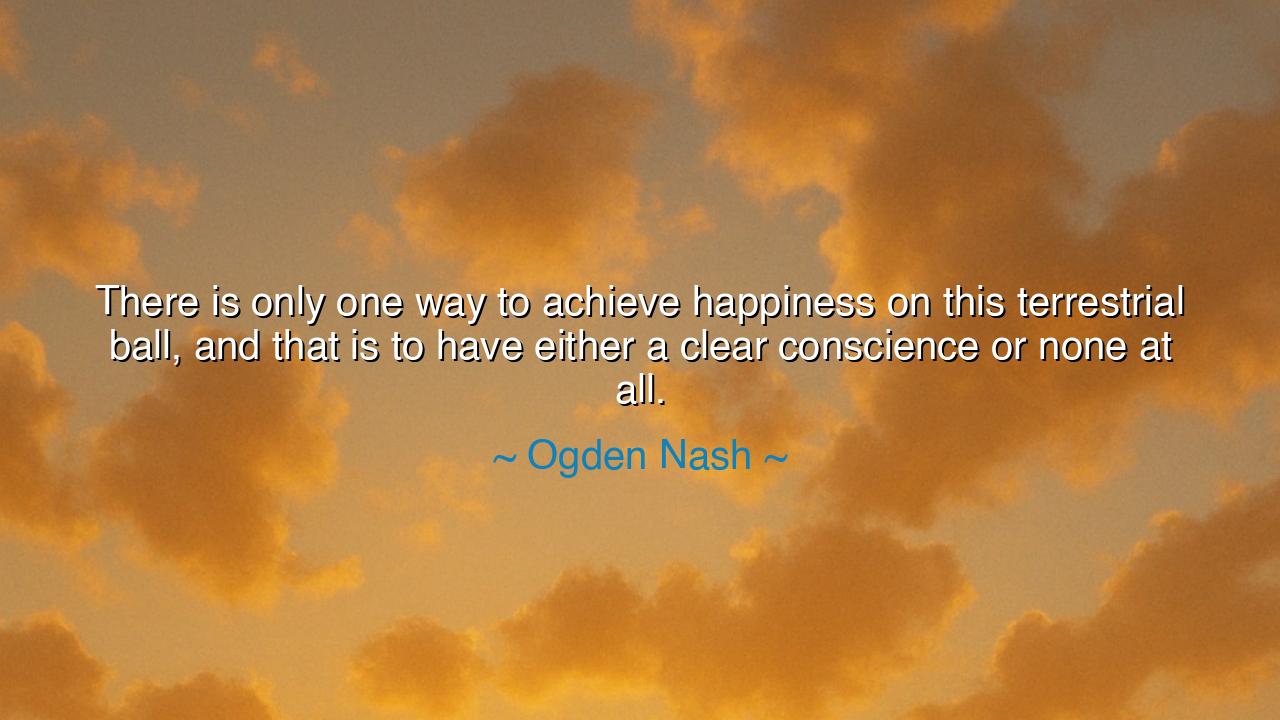
There is only one way to achieve happiness on this terrestrial
There is only one way to achieve happiness on this terrestrial ball, and that is to have either a clear conscience or none at all.






In the witty yet profound words of Ogden Nash, poet of paradox and philosopher of humor, we find a truth wrapped in laughter: “There is only one way to achieve happiness on this terrestrial ball, and that is to have either a clear conscience or none at all.” At first glance, it seems a jest—light, playful, and clever. Yet beneath its surface lies a wisdom sharp as a blade: that happiness and conscience are bound together, and that peace of mind belongs only to those who either live in truth—or have learned to silence truth entirely. Nash, with his gift for humor that hides deep moral clarity, reminds us that the soul cannot rest in half-measures. One must either live with righteousness or surrender to corruption completely—for to dwell between the two is torment.
A clear conscience, he says, is the first path. It is the way of the just, the honorable, the one who seeks alignment between heart and action. The ancients called this “purity of soul.” It does not mean perfection, but sincerity—a heart that strives to do right, that seeks forgiveness when it errs, and peace when it mends. The man with a clear conscience may sleep soundly even in poverty, for his spirit is unburdened. He may face the storms of the world, yet within him, all is calm. For happiness is not the absence of hardship, but the presence of inner harmony—that serene knowledge that one has done what is right, and stands blameless before one’s own soul.
The second path, the darker one, is that of the man who has no conscience at all—who feels neither guilt nor compassion, who has silenced the inner voice that accuses. Such a man, too, may seem “happy,” for nothing troubles him. But his joy is not the light of peace—it is the stillness of a heart turned to stone. Nash’s irony cuts deep here: he exposes the truth that the most contented among the wicked are those who have utterly killed their sense of good and evil. For guilt is suffering, and those who feel none may laugh freely—but their laughter, though loud, is empty. To be without conscience is to be free of pain, but also free of humanity.
Between these two paths—the clear and the absent conscience—lies the most miserable condition of all: a conscience that is burdened but not silenced, awakened but not obeyed. This is the man who knows right but does wrong; who feels guilt but hides it beneath laughter; who seeks happiness but drags his sins behind him like chains. His soul is at war with itself. He cannot enjoy pleasure without remorse, nor silence his remorse without guilt. To such a man, every joy tastes bitter, for his heart knows it was bought at the cost of truth. And thus Nash teaches us that half-truths of morality bring only full sorrow—better to be righteous or wholly corrupt than to live in the agony of divided purpose.
History offers us many such examples. Think of Macbeth, the once noble warrior who, driven by ambition, spilled innocent blood to seize the throne. At first, he gains power, glory, and all that the world calls success. Yet soon his victories turn to ashes, for his conscience becomes his tormentor. “O, full of scorpions is my mind,” he cries, as sleep itself abandons him. He had the courage to commit evil, but not the coldness to forget it. He achieved everything—except peace. Had he remained virtuous, or been truly heartless, he might have been content. But in choosing both ambition and guilt, he destroyed his happiness entirely. Such is the torment of the half-conscience.
The clear conscience, however, brings a different kind of joy—quiet, enduring, and strong. It does not glitter like the pleasures of the world, but it endures when all else fades. The saint, the honest worker, the mother who sacrifices, the friend who speaks truth at cost—all carry within them a light that no darkness can extinguish. Their joy may not be loud, but it is deep; it may not be easy, but it is eternal. To live with a clear conscience is to live in harmony with one’s higher self, to walk the earth in freedom, unchained by guilt, untormented by deceit. It is to dwell in the quiet company of one’s own truth.
So, my children of thought, choose your conscience wisely. If you cannot yet purify it, then do not deaden it; if you cannot silence guilt, then let it guide you back to goodness. Strive each day to lighten your spirit by right action, by honesty, by kindness. For happiness, as Nash reminds us, is not the gift of chance, but the fruit of peace within. To have a clear conscience is to walk as a friend to yourself and to the universe. To have none is to lose your soul. And to have a troubled one is to dwell in ceaseless storm. Therefore, seek clarity, seek truth, and let your happiness rise not from forgetting your conscience, but from keeping it radiant and pure.
And remember this eternal law: Happiness and conscience are twins—when one is clean, the other smiles; when one is corrupt, the other dies. Live so that your heart may rest upon your pillow without fear, and joy will follow you as faithfully as your own shadow beneath the sun.






AAdministratorAdministrator
Welcome, honored guests. Please leave a comment, we will respond soon